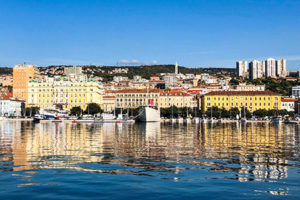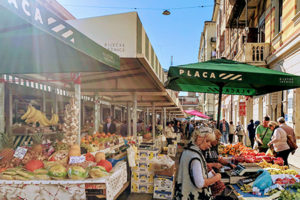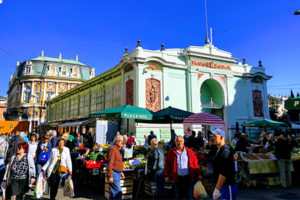
TCJ: So, Douglas, let’s start at the beginning. What brought you to Croatia initially?
Douglas: Back in the early 1990s, when I was much younger and single, I had the good fortune to travel abroad a few times, and as a result, a permanent wanderlust overcame me. By then, I had visited southeast Asia and the U.K. and Ireland on business, and I had been lucky enough to have combined some sight-seeing on each journey. I absolutely loved it. I had been living in rural Iowa for the previous six years and I dreamed about working full-time in a foreign country on a long-term basis. When the contract in which I’d been committed expired in late 1994, I was at a crossroads professionally. The night before I was scheduled to meet a banker to finance a new clinic, my touch-tone telephone rang. The ensuing conversation changed my life forever. On the line was a former classmate who had relocated to Italy after graduation. Somewhere along the way, he had found a job in the city of Rijeka in the newly formed Republic of Croatia. This friend had recently relocated to Zagreb and was calling on behalf of a medical doctor from Rijeka who was interested in adding a chiropractor to his clinic staff. Ten days later I was on a jet airplane heading to a country in which I had no knowledge in terms of history or culture.
TCJ: Wow, that sounds like quite a serendipitous turn of events. You’ve been in Croatia for more than 20 years now. Can you tell us why you have stayed?
Douglas: As stated, my arrival to Croatia was more of a spontaneous experiment than a fixed plan that had developed over time. Originally, I thought I might stay for six months and return to Iowa when the excitement waned. That soon became a year, then two, and so on. The relaxed pace of life in Croatia gradually grew on me, and the stressful thoughts of running an office in the States became less appealing. But the main reason I have stayed is one of the oldest in the books. Love! I met my future wife, a Hrvatica from Rijeka, and we built a life together in her home city. People in Croatia have a saying, “You are from where your wife is from,” and in my case, it certainly rings true.



TCJ: That’s a wonderful saying. It seems that all of the pieces really fell into place when you moved to Croatia. I’m sure you never could have expected things to work out so wonderfully! What were your first thoughts upon receiving the job offer to work in Croatia? Did you have any misconceptions prior to moving there?
Douglas: When my colleague called me about the original job prospect, I was reluctant to pursue the offer. This was the result of the nightly news reports covering the fighting in Bosnia and Croatia I’d seen on television over the previous few years. I seriously considered what I would be getting into, and I wondered if I would be entering an active war zone. After a prolonged reassurance from my friend that Rijeka had not been touched by the fighting, and that the war in the region had effectively ended, I decided to ponder the possibility for a couple of days. By the third day, my sense of adventure dominated my decision-making process and I decided to accept the offer. I felt certain I would have regretted not going later in life if I declined the offer. In retrospect, I was correct. I have no regrets.
Of course, additional misconceptions would have come to light prior to moving to Croatia except for, at that moment, I had so little knowledge about where I was going that there was little for me with which to misconceive. But sometimes ignorance is bliss, and I arrived in Croatia without expectations or pre-determined prejudices. I simply appeared in my new country, suitcase in hand, and began the learning process of how things work from scratch. Ironically, I learned I was an anomaly, a sort of a reverse immigrant compared to what many Croats had experienced over the previous century.
TCJ: You were certainly ahead of your time! But you’ve paved the way for a new generation. Croatia is becoming increasingly popular among expats. Has your experience there changed your view of Europe as a whole? What about of the USA?
Douglas: No. The two are entirely different entities, and I learned that fact earlier in my travels. Each has its strengths and drawbacks. Both have distinct similarities while simultaneously being worlds apart. I cannot pick which lifestyle I prefer more. I confess there have been many occasions over the years in Croatia when I considered ‘throwing in the towel,’ and returning to the US. However, each time I visit the States for a summer vacation, I am usually ready to return to Croatia after the third week. I realize not everyone may share my feelings on the matter.
TCJ: You’ve gotten to see a side of Croatia that few others do. How does living in Croatia differ from being a visitor there?
Douglas: As mentioned, I have traveled to many different countries as a tourist. Each destination filled my senses with interesting sights, exotic smells, and different tastes that left lasting impressions about my visit. While exploring any country as a tourist, the change of scenery and culture all appear so enticing. But I have found it isn’t until you’ve lived in any particular place for six months, more or less, before the subtle realities seep into your consciousness, and then progressively begin to amplify. In that regard, Croatia is no different.
Like any place else, there is a learning phase involved about how things work in Croatia compared to an expat’s country of origin. Life in Croatia presents unexpected delays and undesired distractions, and conversely, unexpected delights. The sooner you learn how the game is played, the better off you are. The level of difficulty required to adjust depends a lot upon a newcomer’s willingness to accept a different lifestyle and mentality. Upon first arrival from other western countries, you might feel right at home, but that sense of familiarity can be deceiving. As stated in a line from the character Morton Riggs in my first novel, ‘Into Hell’s Fire’, “These people look like us but they don’t act like us, think like us, or resemble us in any other way.” Often, the differences are slight, almost microscopic. Other traits are more obvious and stand out like a sore thumb. Such traits might include work ethic, workmanship, logic, time management, deadlines, and more. This, however, is a generality, and does not apply to everyone and every situation equally.
Some expats I have known never manage to adapt to the Croatian way of life and they resist acceptance of the lifestyle. Many of them have left for other domiciles. Others, including myself, manage better but struggled during the transition. I chose to use the term undesired distractions above rather than outright problems because most of the obstacles always seem to be resolved over time. Usually, an expat will wonder why most of these unnecessary troubles occurred in the first place. Yet, they do happen, and more often than expected. But with patience and determination, each challenge is usually overcome. Living in Croatia can be stressful at times. One need not take it personally. These unappreciated hindrances happen to everyone whenever you are a stranger in a strange land. In fact, they even happen to the locals.



TCJ: Well, with struggle comes reward, and it sounds as though you’ve adjusted to the challenges of expat life quite well. Are there any discoveries you have made while living in Croatia that are missed by most travelers? What are your favorite ‘off the beaten path’ spots?
Douglas: Absolutely! In fact, there are ‘hotspots’ of which even native Croats, let alone a veteran expat like me, are unaware. A major difference between being an expat and a tourist is that most tourists are time constrained. They want to see the major sights in the shortest amount of time possible, maybe a week, two, or three during a summer holiday. This restricts their ability to find those out-of-the-way gems that are not on most pre-planned itineraries. Expats, on the other hand, may be limited timewise also as most have full time jobs and family obligations. Yet, by living ‘in-country,’ it is easier for them to establish a network of locals who can recommend points of interest and inform about the best deals and food at local restaurants.
My recommendations are limited to the areas where I’ve spent the most time. As I live in Rijeka, I have not visited Slavonia or Dalmatia enough to consider myself any sort of an expert. In fact, I would still consider myself a common tourist while visiting these regions. I primarily spend my free time in the Kvarner region or on the Istrian Peninsula. I do not know Zagreb that well either, yet I have visited the major sights in the capital city over the years. I would recommend visiting Zagreb during the Advent season in December. The city is brilliant and alive at that time, and I’ve enjoyed the event the last three Decembers.
After touring Zagreb’s sights, many visitors impatiently leave the capital headed to other distant destinations on their itinerary. By doing this, they miss out on a favorite spot of mine. I try to make it a point to spend a short time in nearby Samobor, a growing village just a short drive west of Zagreb. It is worth taking a stroll through the center and along the Riverwalk, and then having a coffee or beer at one of the many café bars. On the outskirts of Samobor, in the foothills along the Slovenian border, there are several guesthouses and restaurants to choose from where one can dine on fresh trout or pork cutlets and drink fantastic regional wine. It is an excellent atmosphere to share an afternoon with friends.
Another short daytrip from Zagreb is the Baroque city named Varaždin. It has a beautiful city center which can be explored in a few hours. On the return to Zagreb, it would be worth searching out the impressive Trakošćan Castle. Even for tourists who are not castle enthusiasts, I can vouch for the impressiveness of this one. An hour-long walk around the nearby lake offers terrific scenery with some spectacular views of the castle.
Closer to Rijeka, another ‘under the radar’ recommendation is the romantic hill village named Kastav. A fantastic view of Opatija and the Adriatic Sea awaits visitors, and more restaurants and café bars are present in which to spend a casual afternoon or summer evening.
My final suggestion rests in the heart of Istria where small, cozy restaurants, known as konobas dot the landscape. There are too many to mention by name, but every local has their favorite, so it is easy to ask around to get a recommendation and directions. The menus are nearly the same at each, and the quality and value does not vary much from one to another either. For me, ambiance is key. Which konoba has the best is a matter of opinion. Many konobas are classified as Agrotourism, and their owners grow, produce, and network with other local producers to serve fresh homegrown products on their menu.


TCJ: We couldn’t agree more with your recommendations! You’ve touched on some of our favorite places and we do our best to introduce our travelers to these hidden gems. Now, for our last question… Living in Croatia has clearly had a huge impact on every aspect of your life – How has it influenced and inspired your writing?
Douglas: Living in Croatia has inspired my writing enormously. The idea of writing a novel began swirling around in my mind a few years before my arrival in Croatia when I was living in rural Iowa. However, life in a small town left me uninspired for a storyline or plot, so I ushered the idea to the back of my mind.
Things changed rapidly after I had been in Croatia for a couple years. My parents came for a visit and I arranged for us to take the overnight ferry from Rijeka to Dubrovnik. At the time, there were still many foreign peacekeepers and U.N. officials in the area. On deck during the ferry ride one afternoon, I remember sharing a beer with my father and watching the coastline. Behind us, leaning on a deck rail, a middle-age man dressed in black was talking into a cumbersome, early model cell phone. He paced impatiently and conversed in multiple languages. Who was this man, I thought? A government agent? A foreign spy? In fact, he may have been a travel agent or a local on his way home for all I knew, but I let my imagination run wild and the genesis of my first novel, Into Hell’s Fire, was born. Readers of the novel will see a parallel to this scenario somewhere while reading the book. Eight years later, Into Hell’s Fire was complete!
In hindsight, Into Hell’s Fire was a remarkable success for a first-time author. It was prominently featured in the Balkan War section of the nonfiction book entitled, Docu-Fictions of War, written by Dr. Tatiana Prorokova, a postdoctoral researcher and lecturer in the Department of English and American Studies at the University of Vienna.
In 2019, Into Hell’s Fire was awarded by the Croatian publisher VF Libris to be translated, published and distributed for the Croatian market. The title of the translated version is ‘Kroz Vatre Paklene,’ and it can be ordered at any Hoću-knjigu bookstore in Croatia.
Based on my first book’s success, I decided to change genres and topics for my second effort. This novel, The Long Way Around, was completed in early 2020. It is an action/adventure, family drama which, ironically, is set in my home state. Based on the information provided earlier in this interview, readers of The Long Way Around may see similarities to my experience of living in rural Iowa. Yet, my Croatian life was included in the story, too, and many readers with Croatian heritage will be delighted to meet the character Tomislav Novak, a proud member of the Croatian diaspora hailing from Louisiana.
